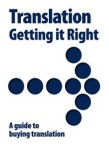Translator or interpreter?
In a nutshell, translators write and interpreters speak. If you want to have a written document translated, you’re looking for a translator. If you need someone to translate the testimony of a witness in court or someone to translate a speech at an international conference, you’ll want to hire an interpreter. Translators generally work into their native or dominant language (the “target” language) from another language (the “source” language). Some interpreters work only into their native/dominant language. Others, especially court interpreters, work both into and out of their native/dominant language.
Individual or company?
An individual translator or interpreter can offer you personal service and a one-to-one working relationship. By hiring an independent, or freelance, translator or interpreter who specializes in your field, and working with the same individual from project to project, you can be assured of continuity and attention to your special needs. For larger projects, or for language combinations not offered by our individual members, a language services company may be a better option. Companies have the resources to manage large projects involving numerous translators or interpreters and/or multiple languages.
For additional tips on hiring the right professional for your job, see one of the “Getting it Right” publications of the American Translators Association.
How do I get a certified translation?
Unlike in some other countries (Mexico and France, for example), there is no government agency in the United States that certifies translators, so there is no such thing as an official, legally certified translation. However, a translator can provide you with a translator’s declaration affirming that he/she has translated a document and that the translation is, to the best of the translator’s knowledge, a faithful translation of the original document. The declaration may be signed in the presence of a notary public, but the notary takes no responsibility for the accuracy of the translation. The American Translators Association, a nongovernmental professional association, offers certification for translators, but a translator does not have to be ATA-certified to provide a translator’s declaration. For more information, see “What is a certified translation?” on the ATA website.
Getting it right
For additional information on choosing the right translator or interpreter for your needs, see one of the “Getting it Right” publications of the American Translators Association.



Comments are closed.